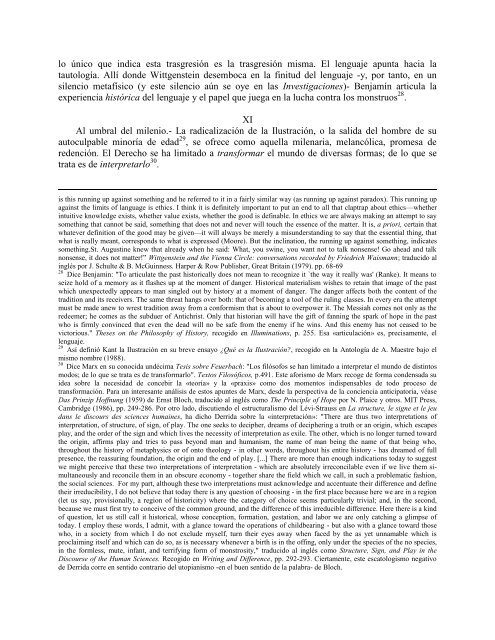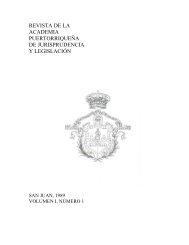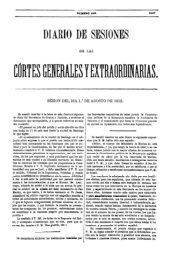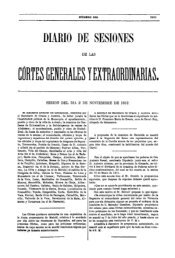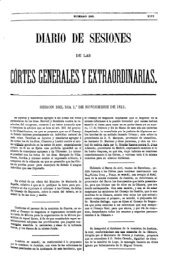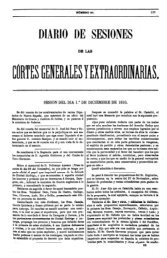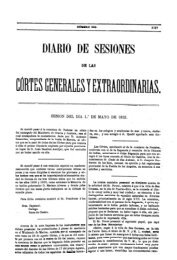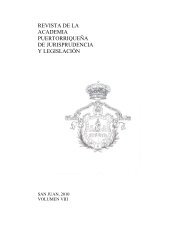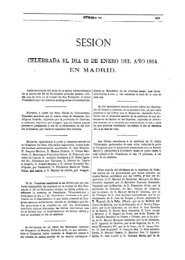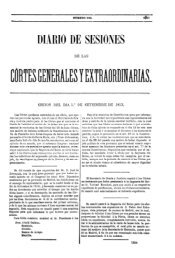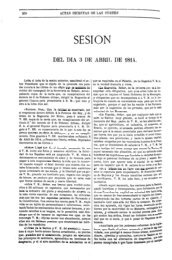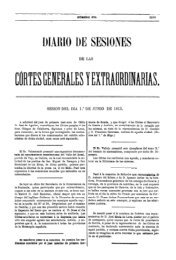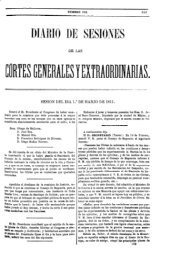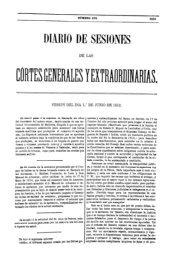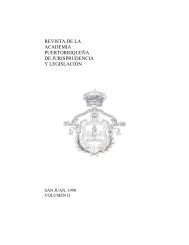lo único que indica esta trasgresión es la trasgresión misma. El lenguaje apunta hacia latautología. Allí don<strong>de</strong> Wittgenstein <strong>de</strong>semboca en la finitud <strong>de</strong>l lenguaje -y, por tanto, en unsilencio metafísico (y este silencio aún se oye en las Investigaciones)- Benjamín articula laexperiencia histórica <strong>de</strong>l lenguaje y el papel que juega en la lucha contra los monstruos 28 .XIAl umbral <strong>de</strong>l milenio.- La radicalización <strong>de</strong> la Ilustración, o la salida <strong>de</strong>l hombre <strong>de</strong> suautoculpable minoría <strong>de</strong> edad 29 , se ofrece como aquella milenaria, melancólica, promesa <strong>de</strong>re<strong>de</strong>nción. El Derecho se ha limitado a transformar el mundo <strong>de</strong> diversas formas; <strong>de</strong> lo que setrata es <strong>de</strong> interpretarlo 30 .is this running up against something and he referred to it in a fairly similar way (as running up against paradox). This running upagainst the limits of language is ethics. I think it is <strong>de</strong>finitely important to put an end to all that claptrap about ethics—whetherintuitive knowledge exists, whether value exists, whether the good is <strong>de</strong>finable. In ethics we are always making an attempt to saysomething that cannot be said, something that does not and never will touch the essence of the matter. It is, a priori, certain thatwhatever <strong>de</strong>finition of the good may be given—it will always be merely a misun<strong>de</strong>rstanding to say that the essential thing, thatwhat is really meant, corresponds to what is expressed (Moore). But the inclination, the running up against something, indicatessomething.St. Augustine knew that already when he said: What, you swine, you want not to talk nonsense! Go ahead and talknonsense, it does not matter!” Wittgenstein and the Vienna Circle: conversations recor<strong>de</strong>d by Friedrich Waismann; traducido alinglés por J. Schulte & B. McGuinness. Harper & Row Publisher, Great Britain (1979). pp. 68-6928Dice Benjamin: "To articulate the past historically does not mean to recognize it `the way it really was' (Ranke). It means toseize hold of a memory as it flashes up at the moment of danger. Historical materialism wishes to retain that image of the pastwhich unexpectedly appears to man singled out by history at a moment of danger. The danger affects both the content of thetradition and its receivers. The same threat hangs over both: that of becoming a tool of the ruling classes. In every era the attemptmust be ma<strong>de</strong> anew to wrest tradition away from a conformism that is about to overpower it. The Messiah comes not only as there<strong>de</strong>emer; he comes as the subduer of Antichrist. Only that historian will have the gift of fanning the spark of hope in the pastwho is firmly convinced that even the <strong>de</strong>ad will no be safe from the enemy if he wins. And this enemy has not ceased to bevictorious." Theses on the Philosophy of History, recogido en Illuminations, p. 255. Esa «articulación» es, precisamente, ellenguaje.29Así <strong>de</strong>finió Kant la Ilustración en su breve ensayo ¿Qué es la Ilustración?, recogido en la Antología <strong>de</strong> A. Maestre bajo elmismo nombre (1988).30Dice Marx en su conocida undécima Tesis sobre Feuerbach: "Los filósofos se han limitado a interpretar el mundo <strong>de</strong> distintosmodos; <strong>de</strong> lo que se trata es <strong>de</strong> transformarlo". Textos Filosóficos, p.491. Este aforismo <strong>de</strong> Marx recoge <strong>de</strong> forma con<strong>de</strong>nsada sui<strong>de</strong>a sobre la necesidad <strong>de</strong> concebir la «teoría» y la «praxis» como dos momentos indispensables <strong>de</strong> todo proceso <strong>de</strong>transformación. Para un interesante análisis <strong>de</strong> estos apuntes <strong>de</strong> Marx, <strong>de</strong>s<strong>de</strong> la perspectiva <strong>de</strong> la conciencia anticipatoria, véaseDas Prinzip Hoffnung (1959) <strong>de</strong> Ernst Bloch, traducido al inglés como The Principle of Hope por N. Plaice y otros. MIT Press,Cambridge (1986), pp. 249-286. Por otro lado, discutiendo el estructuralismo <strong>de</strong>l Lévi-Strauss en La structure, le signe et le jeudans le discours <strong>de</strong>s sciences humaines, ha dicho Derrida sobre la «interpretación»: "There are thus two interpretations ofinterpretation, of structure, of sign, of play. The one seeks to <strong>de</strong>cipher, dreams of <strong>de</strong>ciphering a truth or an origin, which escapesplay, and the or<strong>de</strong>r of the sign and which lives the necessity of interpretation as exile. The other, which is no longer turned towardthe origin, affirms play and tries to pass beyond man and humanism, the name of man being the name of that being who,throughout the history of metaphysics or of onto theology - in other words, throughout his entire history - has dreamed of fullpresence, the reassuring foundation, the origin and the end of play. [...] There are more than enough indications today to suggestwe might perceive that these two interpretations of interpretation - which are absolutely irreconcilable even if we live them simultaneouslyand reconcile them in an obscure economy - together share the field which we call, in such a problematic fashion,the social sciences. For my part, although these two interpretations must acknowledge and accentuate their difference and <strong>de</strong>finetheir irreducibility, I do not believe that today there is any question of choosing - in the first place because here we are in a region(let us say, provisionally, a region of historicity) where the category of choice seems particularly trivial; and, in the second,because we must first try to conceive of the common ground, and the difference of this irreducible difference. Here there is a kindof question, let us still call it historical, whose conception, formation, gestation, and labor we are only catching a glimpse oftoday. I employ these words, I admit, with a glance toward the operations of childbearing - but also with a glance toward thosewho, in a society from which I do not exclu<strong>de</strong> myself, turn their eyes away when faced by the as yet unnamable which isproclaiming itself and which can do so, as is necessary whenever a birth is in the offing, only un<strong>de</strong>r the species of the no species,in the formless, mute, infant, and terrifying form of monstrosity," traducido al inglés como Structure, Sign, and Play in theDiscourse of the Human Sciences. Recogido en Writing and Difference, pp. 292-293. Ciertamente, este escatologismo negativo<strong>de</strong> Derrida corre en sentido contrario <strong>de</strong>l utopianismo -en el buen sentido <strong>de</strong> la palabra- <strong>de</strong> Bloch.
LA PERSECUCIÓN POR RAZONES POLÍTICAS EN PUERTO RICO,Y LA GÉNESIS Y EL DESARROLLO DE LA COMISIÓN DE DERECHOS CIVILESLcdo. Flavio Cumpiano Alfonso“Since the general civilization of mankind, I believe there are moreinstances of the abridgment of the freedom of the people by gradual andsilent encroachments of those in power than by violent and sud<strong>de</strong>n usurpations.James Madison 1Con la Comisión <strong>de</strong> Derechos Civiles, Puerto Rico cuenta con un organismo que ha tenidoconsi<strong>de</strong>rable ingerencia en la <strong>de</strong>fensa <strong>de</strong> los <strong>de</strong>rechos constitucionales <strong>de</strong> los puertorriqueños.Entre las contribuciones más valiosas <strong>de</strong> esta Comisión, cabe resaltar sus esfuerzos para concienciaral pueblo sobre la persecución por razones políticas o i<strong>de</strong>ológicas, en general, y sobre lapráctica gubernamental <strong>de</strong> mantener listas <strong>de</strong> “subversivos”, en particular.La génesis <strong>de</strong> la Comisión <strong>de</strong> Derechos Civiles se remonta a diciembre <strong>de</strong> 1955, cuando laAsamblea General <strong>de</strong> las Naciones Unidas aprobó una resolución para ofrecer servicios <strong>de</strong>asesoramiento a los gobiernos interesados en estudiar la vigencia <strong>de</strong> los <strong>de</strong>rechos humanos en susrespectivos países. A raíz <strong>de</strong> dicha resolución, el entonces Gobernador <strong>de</strong> Puerto Rico, LuisMuñoz Marín, invitó a Roger N. Baldwin, asesor <strong>de</strong> la Secretaría <strong>de</strong> las Naciones Unidas y exPresi<strong>de</strong>nte <strong>de</strong> la Unión Americana <strong>de</strong> Liberta<strong>de</strong>s Civiles (ACLU, por sus siglas en inglés), paraque le asesorara en torno a la organización <strong>de</strong> la labor correspondiente.Baldwin, <strong>de</strong> visita en Puerto Rico el 10 <strong>de</strong> febrero <strong>de</strong> 1956, elogió la iniciativa <strong>de</strong> Muñoz,anunció que el Estado Libre Asociado “es el primer Gobierno en solicitar que se investigue elfuncionamiento <strong>de</strong> los <strong>de</strong>rechos civiles”, y urgió a otros gobiernos a seguir este ejemplo, ya que“ellos sabrán que, tanto los directores <strong>de</strong> las Naciones Unidas, como los directores nogubernamentales, pue<strong>de</strong>n ayudar a levantar los niveles <strong>de</strong> los <strong>de</strong>rechos <strong>de</strong> los ciudadanos. 2 Al díasiguiente <strong>de</strong> la visita <strong>de</strong> Baldwin a la Isla, el Gobernador anunció la creación <strong>de</strong>l Comité <strong>de</strong>Derechos Civiles para estudiar y evaluar los <strong>de</strong>rechos y garantías individuales consignadas en laConstitución <strong>de</strong>l Estado Libre Asociado.Es importante recordar el contexto histórico en que dicho Comité fue formado, para unmejor entendimiento <strong>de</strong>l impacto que tuvieron las recomendaciones <strong>de</strong> Baldwin al GobernadorLuis Muñoz Marín. La famosa Ley 53, mejor conocida como la Ley <strong>de</strong> la Mordaza, había sobrevividolos fuertes ataques <strong>de</strong>l pueblo y <strong>de</strong> la prensa <strong>de</strong>l país, <strong>de</strong>s<strong>de</strong> el inicio <strong>de</strong>l proceso que llevóa su aprobación por la Asamblea Legislativa el 21 <strong>de</strong> mayo <strong>de</strong> 1948. Esta ley, importaciónboricua <strong>de</strong> la llamada Ley Smith 3 <strong>de</strong> los Estados Unidos, tipificaba como <strong>de</strong>lito grave el “fomentar,abogar, aconsejar o predicar, voluntariamente o a sabiendas, la necesidad, <strong>de</strong>seabilidad oconveniencia <strong>de</strong> <strong>de</strong>rrocar, <strong>de</strong>struir o paralizar el Gobierno Insular, o cualquier subdivisiónpolítica <strong>de</strong> éste, por medio <strong>de</strong> la fuerza o la violencia; y el imprimir, publicar, editar, circular,ven<strong>de</strong>r, distribuir o públicamente exhibir con la intención <strong>de</strong> <strong>de</strong>rrocar..., así como el organizar oayudar a organizar cualquier sociedad, grupo o asamblea <strong>de</strong> personas que fomenten, aboguen,aconsejen o prediquen tal cosa...” Luego <strong>de</strong> la insurrección Nacionalista <strong>de</strong> 1950, la Asamblea1Discurso pronunciado ante la Convención <strong>de</strong>l Estado <strong>de</strong> Virginia el 6 <strong>de</strong> junio <strong>de</strong> 1788. The Papers of James Madison, ed.Robert A. Rutland & Charles F. Hubson, vol. 11, 79 (1977).2EL IMPARCIAL, 10 <strong>de</strong> febrero <strong>de</strong> 1956, p. 3, citado en: Ivonne Acosta, La Mordaza, 189, (1987).354 Stat 670, 671; 18 USC sec. 2385 (1940).
- Page 1 and 2:
REVISTA DE LA ACADEMIA PUERTORRIQUE
- Page 3:
2enardecerá, en vez de corregir, l
- Page 9 and 10:
través de la Ley, enardecerá, en
- Page 11 and 12:
MEDICINE AND BIOLOGY: HOW FAR CAN T
- Page 13:
unfair, in view of the total absenc
- Page 16 and 17:
CONTESTACIÓN AL DISCURSO DEL HON.
- Page 18 and 19:
la Oficina de Política sobre Cienc
- Page 20 and 21:
códigos de ética existentes y los
- Page 22 and 23:
REFORMING THE FEDERAL SENTENCING GU
- Page 24 and 25:
narcotics and firearms, they tend t
- Page 26 and 27:
Our faith in technology and plannin
- Page 28 and 29:
single, all-powerful judge”. 17 W
- Page 30 and 31:
CONTESTACIÓN AL DISCURSO DEL HON.
- Page 32 and 33:
3trafficking and gun-related offens
- Page 34 and 35:
5conduct which experience has shown
- Page 36 and 37:
2En este escrito trataré de establ
- Page 38 and 39:
4atender sus obligaciones económic
- Page 40 and 41:
6B. Juicio Público: Al igual que e
- Page 42 and 43:
8explicar la doctrina vigente. 47 A
- Page 44 and 45:
10tan serio disturbio emocional (
- Page 46 and 47:
12En Soto Ramos v. Superintendente
- Page 48 and 49:
14profesional y cómo ésta podría
- Page 50 and 51:
16Las implicaciones de esta exigenc
- Page 52 and 53:
18jurado. 116 Por otro lado, nuestr
- Page 54 and 55:
20forma rigurosa, de que la renunci
- Page 56 and 57:
22Tribunal Supremo ha seguido celos
- Page 58 and 59:
24protección es mayor que la que e
- Page 60 and 61:
264. Absuelto un acusado por determ
- Page 62 and 63:
28En Puerto Rico sólo cabe regular
- Page 64 and 65:
30B. Aplicación ex post facto de l
- Page 66 and 67:
32relación con el alcance 224 de l
- Page 68 and 69:
34se trata de una norma que comenz
- Page 70 and 71:
364) que la corroboración se relac
- Page 72 and 73:
38arresto. Bajo la Enmienda Cuarta,
- Page 74 and 75:
40razonable a la intimidad, no hay
- Page 76 and 77:
42Nuestra legislación permite la d
- Page 78 and 79:
44Derechos se dispone expresamente
- Page 80 and 81:
46Estados Unidos, adopta una posici
- Page 82 and 83: 2Aclarados esos puntos, coincido co
- Page 84 and 85: La verdad es que los principios con
- Page 86 and 87: EL DOLOR Y LA ANGUSTIA MENTALRamón
- Page 88 and 89: 3.7 8 9 10conocida y aceptada, hast
- Page 90 and 91: 5estímulo. Sin embargo, el punto e
- Page 92 and 93: 7de reconocimiento mundial, como ex
- Page 94 and 95: dice que éste no distingue entre e
- Page 96 and 97: 11dos meses y medio más tarde cuan
- Page 98 and 99: implicaciones negativas. Se debe de
- Page 100 and 101: 2naturaleza de los seres vivos, apl
- Page 102 and 103: 4de la clase dominante en la socied
- Page 104 and 105: 6su hora admitió ser identificado
- Page 106 and 107: 8cumpla la prestación que la norma
- Page 108 and 109: 10Encontramos la expresión todaví
- Page 110 and 111: 12La satisfacción de necesidades h
- Page 112 and 113: 14como aquí se propone, puede hace
- Page 114 and 115: LOS DERECHOS HUMANOS FRENTE AL ESTA
- Page 116 and 117: Como resultado, se ha llegado a un
- Page 118 and 119: Yugoslavia, Georgia, Azerbaiján, A
- Page 120 and 121: METASTESIS DE LA «RAZÓN» Y EL «
- Page 122 and 123: fue quizás el producto de esa mism
- Page 124 and 125: embargo, la corroboración de la ne
- Page 126 and 127: VICuando Hegel, en su Phänomenolog
- Page 128 and 129: del entendimiento (Verstehen) en el
- Page 130 and 131: por el poder, por las estructuras y
- Page 134 and 135: Legislativa enmendó la Ley 53 orig
- Page 136 and 137: Incluso, únicamente ofreció su t
- Page 138 and 139: Al llegar a la gobernación en 1965
- Page 140 and 141: Presidente del Tribunal Supremo y a
- Page 142 and 143: Lamentablemente, vivimos en una soc
- Page 144 and 145: 1. El que en todas las acciones rel
- Page 146 and 147: coordinación interagencial, con pa


